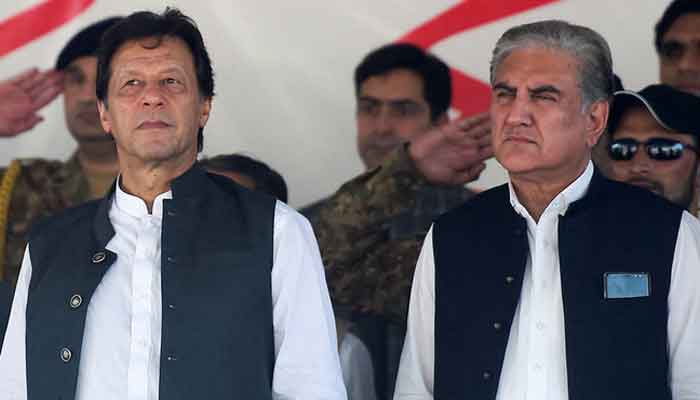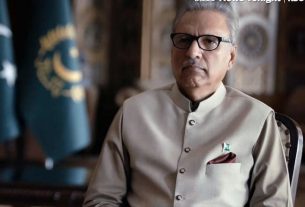Legal experts and analysts shared mixed opinions on the cipher case verdict by the trial court which sentenced Pakistan Tehreek-e-Insaf (PTI) founder Imran Khan and senior leader Shah Mahmood Qureshi to 10 years in prison.
Former prime minister Imran, who was ousted from power via the opposition’s no-trust motion in April last year, is convicted for using diplomatic cable sent by the country’s ambassador in Washington for political purposes.
It is the second conviction for the embattled PTI founder in recent months. He was previously sentenced to three years in a corruption case. While his jail term was suspended as he challenged the corruption conviction, it had already ruled him out of the general elections next month.
Today’s decision was announced verbally by special court judge Abul Hasnat Zulqarnain at the Adiala Jail in Rawalpindi in the presence of both the PTI leaders.
Before announcing the verdict, Judge Zulqarnain, during the hearing, reminded the PTI leaders that their lawyers were not appearing in court and were given state lawyers.
The court also observed that Qureshi and Imran were given the questions under 342. However, Qureshi said that his lawyers are not present so how can they record their statement.
‘Fraud with country’s judicial system’
PTI lawyer Barrister Ali Zafar said all reports and documents that he had seen clearly showed that it was neither a trial nor proceedings of the case but a “fraud with the country’s judicial system”.
He said Khan and Qureshi’s lawyers were barred from contesting the case and state counsels were appointed without the consent of the defendants.
“We will certainly file an appeal against the verdict. This is a blessing in disguise. All standards of justice were not fulfilled,” he added.
The PTI senator said the appeal will be filed in the Islamabad High Court (IHC) wherein they will seek suspension of conviction and sentence.
‘Due process not followed’
Geo News anchorperson and analyst Shahzeb Khanzada said it was established through evidence that Qureshi and Khan manipulated cipher to build their narrative of ‘foreign conspiracy’.
Nevertheless, the speed with which the trial was conducted gave an impression that the due process was not followed and an attempt was made to sentence them before elections.
Hence, the proceedings raised questions on the way the trial by the court was conducted, he said.
Khanzada said even though the evidence was clear as the former foreign secretary and ambassador both said that no such thing as conspiracy or threat against Khan was mentioned in the cipher and they just recommended issuing demarche to US, the PTI top leaders used a diplomatic document for political gains that put Pakistan’s relations with the US at risk.
’10-year imprisonment is less’
Legal expert and former Attorney General for Pakistan (AGP) Ashtar Ausaf said while the PTI had the right to appeal the verdict in the higher courts, however at the trial court’s level Khan and Qureshi were sentenced in the case.
He said it was not the first time that a statesman had been convicted for violating a country’s official secrets. Former US president Richard Nixon had to resign after he faced similar charges in a case, however, later he was pardoned by his successor.
“I feel 10 years imprisonment is less punishment as on such a felony one should be given the severest possible punishment,” he said.
‘Irresponsible to misuse PM Office’
Commenting on the verdict, senior analyst Muhammad Ali told Geo News that the office of the prime minister and federal cabinet were the highest constitutional forum.
He said the former prime minister and ex-foreign minister clearly violated their oaths of not revealing any state secret.
“It is a very careless and irresponsible act to use the office of prime minister to violate the Official Secrets Act,” he added.
He said the sanctity of the Foreign Office’s international diplomatic communication system was violated just because the prime minister was “being ousted from power via a no-confidence motion”.
“They undermined Pakistan’s national security for political purposes,” he said.
‘Against diplomatic norms to declassify cipher’
Speaking to Geo News legal expert Hafiz Ahsan said it was against the global diplomatic norms to disclose a cipher or cable in public.
As a prime minister of Pakistan, Imran was legally not allowed to openly discuss the cipher, he said. “Three evidence against Imran were the most important: first former PM aide Azam Khan alleged that Imran did not return the cipher copy after taking it, then an audio surfaced in which the PTI leadership said they would play up the cipher to exploit it for political purpose, two evidence in the case of Asad Majeed and secretary Sohail Mahmood also came who claimed that there was no conspiracy against the Imran government in the document. Then it had to be seen whether this episode escalated tension between Pakistan and US relations, which turned out to be true,” he said.



